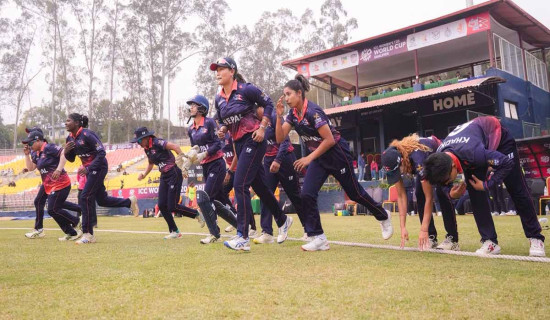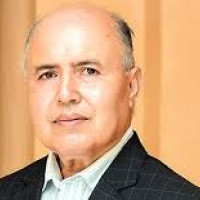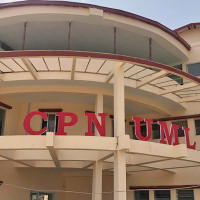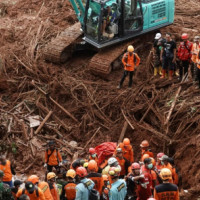- Saturday, 24 January 2026
Parliament Powers The Republic
Republic Day is the most significant achievement in Nepal's political structure. The new system resulted from the ending of the century-old monarchy and the establishment of a democratic structure in 2008. That moment came after years of struggle, which was capped off by the Jana Andolan II, the People's Movement of 2006. That uprising brought together citizens from all walks of life, united by a single goal: to put power where it belongs, in the hands of the people, not in a palace.
From that struggle came a new kind of politics, and at its core was the Nepali Parliament. This wasn't just the next version of what came before; it was something entirely different. Built from the aspirations of a constitutional assembly, it was a fresh beginning. Parliament was now charged with more than just passing laws. It had to help shape a new Nepal, one where the republic wasn't just an idea but a lived reality.
Not so long ago, Nepal stood at a crossroads. The revolution of 2006 was a powerful, emotional turning point. For 19 straight days, ordinary people, farmers, students, teachers, and workers poured into the streets. They braved curfews and crackdowns, not because anyone told them to, but because something profound inside them said it was time. It's time for dignity. It's time for freedom. It's time to be heard.
According to former Law Minister and Attorney General Agni Kharel, it wasn't just a political manoeuvre when King Gyanendra finally stepped aside and reinstated the dissolved Parliament. It was the people's voice being translated into action. From there, the wheels of change turned quickly. The monarchy's powers were stripped, and a new interim constitution was announced. The old Parliament, once sidelined under royal authority, has now become the beating heart of our new democracy.
Now, nearly 20 years into this journey, Parliament still plays a central role, though it hasn't always been smooth. It remains the space where the dreams and frustrations of a nation converge.
"After May 28, 2008, when Parliament abolished the monarchy by majority vote and declared Nepal a federal democratic republic, the first step was to enshrine that name in the Interim Constitution. The new constitution introduced a presidential system. The Election Commission then gave the green light for the election of the President and Vice President," said Kharel.
In 2015, the Constitution of Nepal was promulgated. Laws were revised, and terms such as Shree Paanch and the Kingdom of Nepal were removed from the new constitution following several amendment acts related to republican reforms and various other legislative measures. In this way, Parliament laid the foundation for the Democratic Republic of Nepal," Kharel added.
We can see an incredible mix of people from every district, ethnicity, and walk of life inside the Federal Parliament. Ordinary people have become heads of nation.
They come together to debate, challenge, and express the voice of the voiceless. That diversity isn't just symbolic; it is the essence of a republic, where every citizen deserves a voice.
Without this institution, where would those voices go? Where would the hopes and concerns of millions find a place to be heard? Nowhere quite like Parliament.
The laws made in those halls affect all of us: our rights, our land, our schools, our environment, and our economy. Parliament is the symbol that gives people faith and reassures them that their voices matter. It is where the rule of law, not the rule of the few, guides the nation. Similarly, Parliament is the watchdog over the government, and the government should equally be accountable to the House. Because of the republic, no one person or office holds unchecked power.
After years of debate and deliberation, the Parliament promulgated the new Constitution of Nepal in 2015. This constitution renewed the people's hope that their rightful entitlements were recognised and protected. All Nepalis felt a sense of equality, and the era of domination had come to an end. The Constitution brought new meaning and authority to the republic.
The Prime Minister and the Cabinet must answer to Parliament, representing the people. That accountability, through questions, debates, and investigations, keeps democracy honest. It's what separates a republic from a dictatorship. And while the system isn't flawless, sometimes it drags and sometimes quarrels, it's far better than the alternative.
According to the data from the Federal Parliament Secretariat, as of May 2025, the Parliament has passed 95 laws since its formation in 2017. This includes 73 bills approved by the House of Representatives and 25 by the National Assembly.
The federal Parliament experienced two dissolutions during the tenure of the first parliamentary election (2017–2022), both of which were later overturned by the Supreme Court. The COVID-19 pandemic significantly impacted the country's political and public health landscape. These are some hurdles faced in strengthening the republican system.
Parliament is also where we come together as a country. Nepal is a rich tapestry of cultures, languages, and opinions. We need a place to discuss those differences, not shout over them. That's what parliamentary debate is all about.
Sometimes, national issues arrive in Parliament as debates, becoming part of the healthy practice of learning to live and govern together. The true power of the republic in action can be seen when leaders rise above personal agendas and work for the greater good.
According to former Constituent Assembly member Khimlal Devkota, there are pressing challenges that cannot be overlooked: political instability, frequent changes in government, and legislative deadlock continue to obstruct progress.
Public frustration is growing due to persistent disruptions in parliamentary proceedings, which have delayed the passage of many crucial bills required to implement the federal structure effectively.
"As long as political leadership fails to prioritise long-term national interest over short-term party gains, the federal system will remain fragile and under strain, which will impact the republic status of the nation," said Devkota.
But abandoning the system isn't the answer. Strengthening it is. That means demanding more from our representatives, doing our part as citizens, staying engaged, holding leaders accountable, and never giving up on the idea that real change is possible through democracy.
"A republic is never finished and can only be improved over time. Citizens, responsible institutions, and leaders should work for progress as we celebrate Republic Day. At the centre of that effort is our Parliament, born from struggle, sustained by hope, and powered by the people. It's where laws are made, truths are spoken, and the future is shaped. It is our strength," added Devkota.
The Nepali Parliament was born out of the people's struggle and sacrifice; it didn't just emerge; it was earned. It stands today as one of the most critical institutions in keeping the promise of the republic alive.
The Parliament keeps the spirit of our democracy by performing for the people, passing laws, holding the government accountable, and creating a space for national conversations. It serves as the guarantor of the nation's republican form of government.
(Bhusal is a journalist at The Rising Nepal.)






-original-thumb.jpg)

-square-thumb.jpg)





-original-thumb.jpg)


